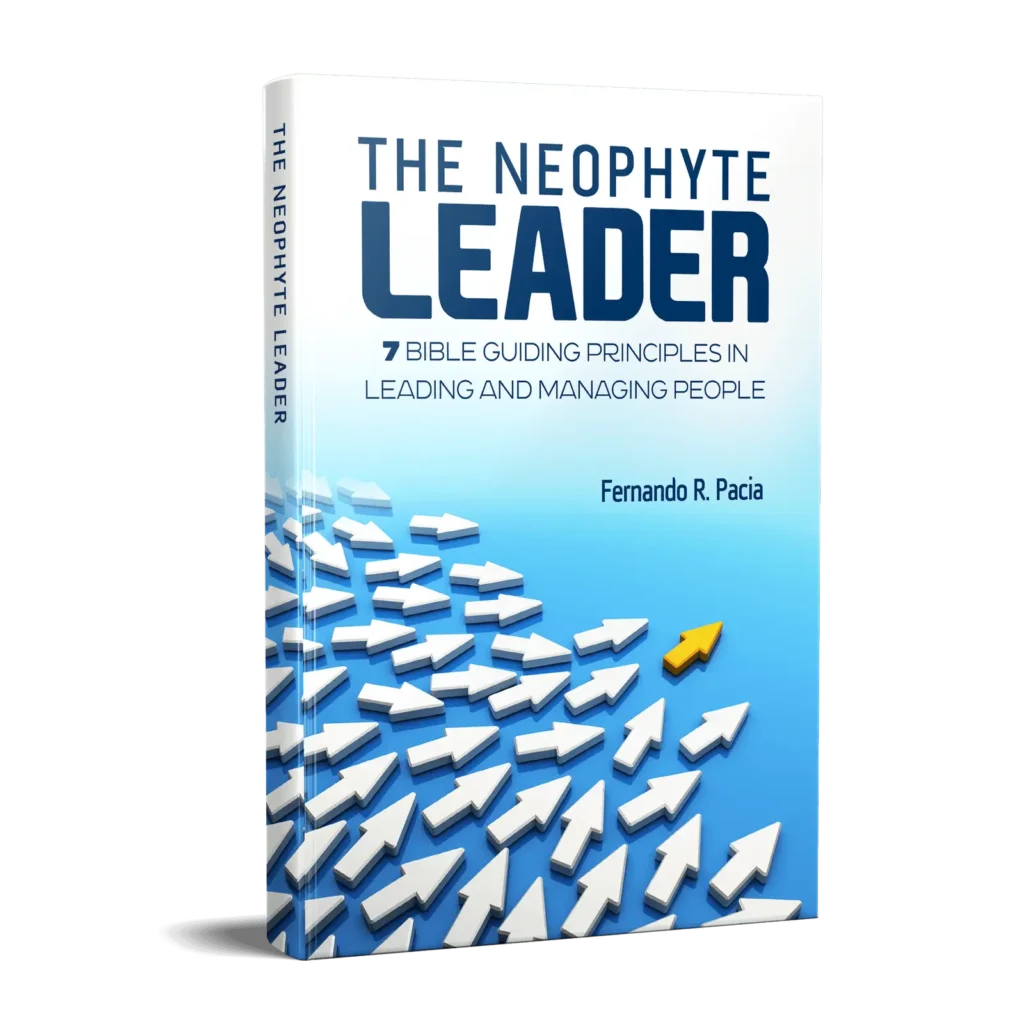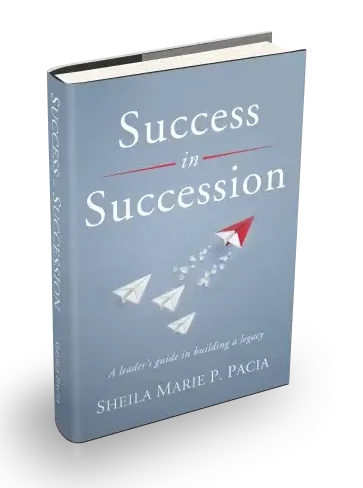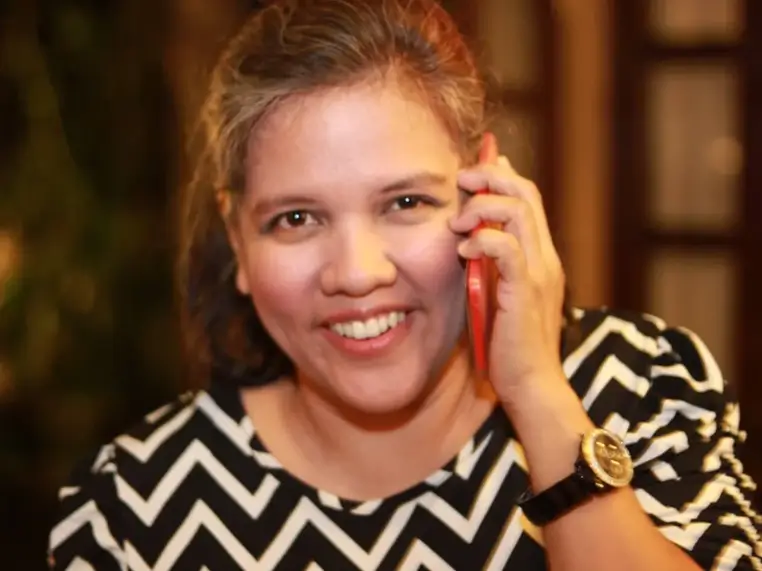Hi, we are a group
of
Managers
Mentors
Coaches
Trainers
We share the same passion for continuous learning and inspiring people in the workplace. Particularly, we offer coaching programs and leadership books dedicated to build and inspire everyday leaders.

GRAB OUR EBOOK NOW WHILE IT’S FREE!
KNOW THE SECRET TO GET THE RESPECT THAT YOU WANT: 3 KEY PRINCIPLES TO EFFECTIVE LEADERSHIP IN A DIVERSE CULTURAL SETTING
When you subscribe to our newsletter, we'll email you occasional news, updates, and relevant promotional material. You can unsubscribe at any time. Read our privacy policy for full details: iteachulead.com/privacy-policy.
OUR BOOKS🚀
Explore powerful leadership insights with The Neophyte Leader and Success in Succession.
These books offer practical wisdom to help you lead with purpose and build a lasting legacy.
Available now on Amazon!

The Neophyte Leader
Fernando R. Pacia
7 Bible Guiding Principles in Leading and Managing People

Success in Succession
Sheila Marie P. Pacia
Your guide in building a legacy
We also offer the following trainings
Basic Occupational Safety and Health (BOSH)
Covers fundamental safety principles to help employees recognize hazards and implement effective preventive measures in the workplace.
Construction Occupational Safety and Health (COSH)
Focuses on safety protocols specific to construction sites, including hazard identification, risk management, and emergency response procedures.
Safety Training for Executives & Managers (STEM)
Designed for senior staff, this training focuses on leadership roles in safety management, ensuring executives and managers foster a culture of safety within their teams.
Safety Management System (SMS)
Teaches the structure, processes, and practices needed to establish and maintain an effective safety management system in any organization.
Mandatory Employees’ OSH Seminar (MESH)
A required seminar for employees, covering basic occupational safety and health guidelines and ensuring compliance with safety regulations.
Safe Use of Chemical at Work
Provides essential knowledge on the safe handling, storage, and disposal of chemicals in the workplace to minimize risks of exposure and accidents.
Behavior-Based Safety (BBS)
Teaches strategies for identifying unsafe behaviors and implementing systems to encourage safer actions and decisions among workers.
ISO 45001 Internal Auditing
Focuses on auditing techniques specific to ISO 45001, the international standard for occupational health and safety management systems.
Defensive Driving
Provides driving techniques to prevent accidents, reduce risks, and promote road safety for employees who drive as part of their job.
Industrial Hygiene
Covers workplace health hazards such as air quality, noise, and exposure to toxic substances, and how to control them to protect workers’ health.
Ergonomics
Focuses on designing work environments and tasks that maximize comfort, efficiency, and safety to prevent injury and strain.
OSH Programming
Focuses on developing and implementing effective occupational safety and health programs tailored to an organization's needs.
AUTHORS/ TRAINORS

Fernando R. Pacia
President / FounderA Mechanical Engineer by profession with a Master's Degree in Business Administration. Working his way up the corporate ladder, Fernando found his calling to create and inspire leaders while leading people of diverse culture, values, and personalities.
Phone: +63 916-6679857 Email: frpacia@iteachulead.com
Sheila Marie P. Pacia
Director for OperationA graduate of Behavioral Science who has been into Training and Organizational Development all her professional life. Her extensive exposure in service operation and business management inspire her more to coach and mentor leaders.
Phone: +63 916-6679857 Email: sheilapacia@iteachulead.com
Rex R. Del Rosario
Managing Director - 2R OSH TRAINING & CONSULTANCYAn OSH expert with 22 years of experience, He is also an Accredited Consultant (DOLE-BWC), Trainer (ILO), and contributor to the RA 11058 IRR. He holds an International OSH Diploma (British Safety Council), a Master’s in Occupational Health (UP), and NEBOSH certification.
Phone: +63 917-8556076 Email: rex.delrosario@2rosh.comLatest Blog
Wisdom in Gardening
How simple gardening taught me a valuable lesson about the necessity of ‘letting go’ in life – Seminarian Joryll Pales,

Wisdom in Gardening
How simple gardening taught me a valuable lesson about the necessity of ‘letting go’ in life
– Seminarian Joryll Pales, Tagum City, Davao Del Norte, Philippines.
St. Irenaeus famously wrote, “The glory of God is a man fully alive.” However, there will always be moments in life when we realize that we are not fully alive, making little to no progress in our career, relationships, or spirituality. On a deeper level, we may carry a sense of dissatisfaction with how our life is unfolding, leading to unhappiness and, in some cases, depression. This begs the question: where did things go wrong? When did this downward spiral of personal stagnation begin? What can we do to escape this cycle? Thousands of self-help books, podcasts, and videos are offering valuable insights and guidance on these questions. In my personal experience, I want to share how tending to my small vegetable garden gave me valuable insight to these question. I also want to introduce in this short essay a bisaya word (a dialect spoken in the central and southern Philippines) that perfectly encapsulates the very essence of its concept.
Our tropical country offers year-round crop growth, even in small gardens. One morning, I noticed my alugbati (a type of leaf vegetable also called as malabar spinach) was growing slowly or not at all compared to other vegetables. I thought it might be due to infertile soil or poor sunlight. Nevertheless, I decided to prune it, cutting off old stems and unhealthy leaves. After a while, it looked bald, stripped of its thick stems and leaves, and I feared it might die. The next week, I was amazed! The alugbati stems grew over 10 centimeters long, and new leaves sprouted. Two weeks later, the leaves and stems grew even thicker and wider, allowing me to harvest and cook it. I realized, it was not about infertile soil and poor sunlight at all. The alugbati simply needed pruning.
Pruning, in the English dictionary, means cutting away or reducing by trimming. Plants and vegetables benefit from pruning because it removes unhealthy parts that consume most of their nutrients, hindering growth. Ironically, pruning my alugbati plant taught me a valuable lesson about letting go in life. Just as pruning is necessary for growth, letting go is essential for personal growth and fulfillment. Interestingly, while pondering on these things, there is a word in bisaya that immediately popped in mind which can perfectly describes the interdependence of letting go and living. It is the word ‘buhi’.
The Bisaya word “buhi” carries a profound and paradoxical meaning. The most commonly understood meaning is “life” and “living.” The word “buhi” (pronounced with the first syllable stressed) literally means “alive,” but it can also mean “life” (kinabuhi) or “living” (nabuhi).The second meaning of “buhi” (pronounced with the last syllable stressed) means “let go.” This dual meaning presents a paradox that highlights the wisdom of letting go (buhi) and embracing life (buhi). For instance, the Bisaya sentence “Buhi para mabuhi” literally translates as “Let go in order to live” or “May kinabuhi sa pagbuhi,” which means “there is a life (or growth) in letting go.”
I find it brilliant and clever that in our dialect, these two meanings are intertwined and united within just a single word. In life, letting go of someone or something, whether it’s a relationship, a habit, or attachment to tangible things, is an inevitable and necessary process of the journey. At the same time, when we let go, another form of life or growth often emerges. Living and letting go are mutually exclusive and interdependent, like one is essential for the other. This concept is elegantly expressed when we prefix the word “buhi” with “Mu-,” creating the action word “Mubuhi,” which means both “to let go and to give life.” We can also find a similar teaching of Jesus highlighting those who ‘loses (let go) their lives for God’s kingdom, will save (live) it. (Matt. 16:25)
Some answers and clues to life’s challenging questions can be found in the most unexpected places, like the corners of our front yards. In fact, we may have already known these answers and clues during our childhood. They are remarkably simple and basic yet still remain hidden from our view. Just as the alugbati vegetables, our slow progress may not be due to where we are at the moment (infertile soil) nor the lack of opportunites we received (poor sunlight). Maybe, what we need is pruning, to cut away and let go of things, thougths or habits that unhealthily consumes the time and energy from us, hindering our progress. Only we can identify these things or relationships in our own lives. Next time, try to remember this Bisaya phrase, “Buhi para mabuhi.” (Let go in order to live) Our unhappiness and personal stagnation, may be replaced by growth that will ultimately gives us joy in life, if and only if, we are willing to let go.
“I planted the seed, Apollos watered it, but God has been making it grow.”
— 1 Corinthians 3:6

Joryll Pales
Seminarian. Mentor. Servant Leader.
His passion for leading the next generation is unwavering. He believes that true leadership begins with service, and he dedicates his life to inspiring and empowering young minds. Grounded in faith and purpose, he strives to be a beacon of wisdom and encouragement, shaping future leaders with integrity and compassion.
Sophia’s Language Autobiography
This is my daughter Sophia’s Essay. Moving from one country to another throughout my life has been interesting, to say

Sophia’s Language Autobiography
This is my daughter Sophia’s Essay.
Moving from one country to another throughout my life has been interesting, to say the least. These past few weeks, learning and reading about how language and worldview are correlated has made me think if I actually look at the world differently than my friends who have lived in the same country or even the same town their whole life. It’s quite hard to believe that I have a different perspective than someone else because of my language background, but at the same time, no minds are alike.
When people ask me what my first language is, it’s kind of hard to answer because I was taught Tagalog, which is the main Philippine language, and English at the same time. In school, we were taught English, but at home, we mostly spoke Tagalog. People in the Philippines knew of English, but not a lot of people could speak it well, and I was one of those people who couldn’t speak it well. I could understand English, but when I spoke it, my sentences were broken; it was faster to answer in Tagalog. I mean, I was only 6, so my knowledge on words and sentences were still developing, but English was not my strongest language.
The transition from the Philippines to England was the hardest. I will never forget the stares I would get from my classmates because of my English; those looks felt degrading. I knew what I wanted to say, but forming the sentence in English was difficult. The Philippines taught American English, so it was hard to keep up with the different names England had for items. Pants were called trousers, a truck was called a lorry, trash was called rubbish, and so many more. I remember going up to my teacher and asking if I could go to the “CR” (or comfort room) which was what we called the bathroom in the Philippines. I stood there for 5 minutes with the urge to go to the bathroom because my teacher couldn’t figure out what it meant. I still kept up with my Tagalog because it was how my parents talked to me at home. They were, and still are, more comfortable speaking in Tagalog than English. To this day, my dad still tells people that he made sure my sister and I knew how to speak and understand Tagalog so if we were ever in trouble, he didn’t have to yell at us in English. My English got better throughout the years and I even gained a British accent, but we had to move again.
Moving to the US was a little easier, but names for items were switched again. Just as I was getting used to British English, I had to relearn American English. My first day of 3rd grade, the teacher asked what was placed at the end of the sentence and I confidently raised my hand and said “A full stop!” The whole class stared at me like I was crazy and the teacher asked if I meant a “period” and I just went with it. My classmates always picked me for popcorn reading because of my accent, but after a few months, my accent sadly disappeared. I was also picking up on American phrases like “under the weather” and “piece of cake.”
After being in the US for nearly 10 years, I do believe my English has gotten better. The only thing is, my vocabulary is not the best. I believe I have a very basic vocabulary. I struggle to write papers because it’s difficult for me to find specific words that sound sophisticated. I always wonder if I have a hard time because I’m bilingual, but I had a classmate who was born and raised in Vietnam and her English vocabulary was way more advanced than mine; it naturally came to her! Maybe it’s genetic, but I do wish words came to me effortlessly. I also often wonder if I had stayed in the Philippines, would my vocabulary be better? Would I know more complex Tagalog words? I am never going to know.
I can still speak and understand Tagalog which I am very proud of. I do admit though, it is slowly starting to go away. I have to think about it first before I say it out loud. If I had to explain what my Tagalog is starting to sound like, I would say it’s like an American, who has never learned or spoke a foreign language, trying to read Spanish. I don’t mean that in any way to be offensive. It’s embarrassing for me though when I try to talk to my family in the Philippines. My dad tells people he wants my sister and I to know Tagalog so he doesn’t have to yell in English for humor, but the actual reason is so we can communicate with our family in the Philippines. I do have cousins that can’t speak or understand Tagalog at all and it is so difficult for them to talk to family because of the language barrier. They can never have an actual conversation with aunts or uncles back at home. They try, but it doesn’t last very long.
One thing that I think is hard to explain as someone who can understand two languages are translations. Subtitles that translate tv shows or movies will never be satisfactory, especially on comedies. Translating a Tagalog comedy will never make sense in another language. It can be translated, but it won’t be funny. Humor is so unique and can’t be explained unless you have lived and experienced a country’s culture.
It’s amazing how each language is arbitrary from one another, which is how the textbook described it. My experience with language is a huge part of who I am. I still think it’s crazy how my brain can automatically interpret different languages and just know what they mean. The way that I have “adapted” to understand Tagalog and types of English has made me believe that my language has impacted the way I look at the world and it’s what makes my “linguistic identity.”
“Now glory be to God, by his mighty power at work within us is able to do far more than we would ever dare to ask or even dream of — infinitely beyond our highest prayers, desires, thoughts, or hopes.”
— Ephesians 3:20 (LB)

Fernando R Pacia
Mechanical Engineer. MBA. Servant Leader.
Son. Brother. Husband. Father.
His dedication to his family is exemplary. The love and support he shares with his wife and two daughters are the very source of his strength and inspiration. He also knows that leadership is best learned first at home.
Parenting: A Neophyte Leadership Story
As a new parent I was often told, “Parenthood doesn’t come with a manual!” Truly, all of us who gave

Parenting: A Neophyte Leadership Story
As a new parent I was often told, “Parenthood doesn’t come with a manual!”
Truly, all of us who gave life to a newborn, have gone through a newbie stage. There is really no fixed and fast rule that even our own parents can handover to us in a platter.
Up until now I cannot describe how confused, worried, yet overwhelmingly happy I was when I heard that first loud cry as I gave birth to a new living being. It’s the best gift I ever received on New Year’s Eve! Honestly, I appreciated my mother all the more the very moment I became one. But, I lost my mom early in life and I miss her that day when I delivered her healthy grandson to this world. And I miss her even more as I learn motherhood, mostly, all by myself. I guess no one can really prepare us for this unique kind of leadership which is also known as parenthood! All I know is that we are all destined to learn it and excel differently as a parent.
As I embrace wholeheartedly the responsibility of being a mother, I realized that parenting is Mindful Leadership. It changes my perspective. I suddenly care more for my child and also for other people. I know that it will take a whole village to raise a child and there are things I cannot control except for the way my husband and I can prepare him for a better tomorrow by providing him the love and care that he needs.
As a parent, we are trusted with an individual to nurture endlessly, putting us in a serious business of building a character through unconditional loving. It’s a 24/7 leadership work with no days off that comes with smiles, hugs, and kisses as consolation. A leadership opportunity given to many but only few can embrace it with no difficulty. I am just glad that God granted me the gift of motherhood when I felt that I was ready.
My neophyte leadership experience at work was already exciting and fulfilling until it turned out that it could be more when I became a mother. Nothing beats the excitement and fulfillment of having to take care of a child of your own. It’s a continuous learning process complete with joys, pains, and A-ha moments. As a parent trying to teach, coach, and mentor my son, I have plenty of unforgettable leadership experiences with him that is worth sharing.
Here is one of those moments close to my heart. It was when I knew that my son will grow up finding joy in creative learning. At 18, I am just so proud of the things my son has already accomplished for himself. His passion and dedication to study in school, to explore life, and to learn more about his faith are simply remarkable.
I remember quite clearly watching my boy, who was then about 3 or 4 years old, having a hard time writing the number 5. We were inside a tricycle going home from school when he kept on doodling on his notebook a figure of a number that comes after 4. I was really thinking how best to describe the number so he could remember.
I always believed that we are all created equal when it comes to learning but we differ in pacing and learning styles. I know that children’s minds are like a Tabula Rasa – a blank, clear, and clean slate ready to be filled-out with ideas, figures, concepts, and experiences. With my son having both parents as Architects, I was almost sure that he is also a Visual Learner.
And so, in helping him draw the number 5, I showed him how to guide his hands by saying out loud “Guhit, Buntis, Sumbrero!” or “Line, Pregnant, Hat!” And it worked! I am sure while reading this you are also trying it out. Go on don’t be shy, keep in mind those three strokes that best describe the parts of the number 5. I just cannot forget how his eyes lit up when he got the idea and loudly guided his hands on his notebook and got the number 5 right!
My son, Ian Paolo, remembers this particular coaching moment until now. As a learner, he realized that he can best enjoy learning by visualizing and associating things. And as a coach, I knew then that I have to be more and more creative in helping him learn. Let us not forget, there were 8 more numbers left for him to learn and for me to creatively teach him.
For my family, creativity forms part of our everyday routine. We ourselves, as adults, cannot afford to stop learning on how to coach others and improve ourselves as leaders. We know that our leadership will always significantly impact the behavior and performance of our son and the people in the firm we work with.
With Ian now deciding whether to pursue a course in Engineering or Aeronautics, we will soon be facing more challenges to be creative in coaching him in order to help him succeed. We are also very much aware that we are not just building a professional here; we are upbringing a young man to become a responsible adult who has respect for people and sincere love for God.
For parents and leaders like me, everyday is a good opportunity to know the LEARNING STYLES of your children and the people we are helping to develop as future leaders. There is really no one-size-fits-all in the field of learning. The structure of our mind and body are just created so differently from each other that we have so much to appreciate. And nothing can be more fulfilling than seeing your children or employees grow while having fun learning.
Previously, learning styles are commonly classified into just three styles. But with recent studies the classification has evolved and redefined further to help learners gain knowledge more efficiently while teachers facilitate learning more accurately . Below are the Seven Learning Styles:.
- Visual – They are the ones who doodle a lot on their notebooks. Their faces lit up when you let them see pictures or drawings to describe a concept or an idea. Visual learners can easily follow a procedure once shown or demonstrated step by step. Visual learners excel as Architects, Engineers, Designers, and Artists.
- Auditory – They love reading out loud and thinking out loud, too. Don’t panic, it’s alright. They may appear like talking to themselves but not exactly. You won’t see them answering back. They can just best absorb ideas and concepts when they hear it. They establish musical patterns to help them remember. Try to recall how the children’s TV show “Sesame Street” described numbers or letters by letting the Muppet sing. Musicians, Speech Pathologists, Audio-acoustic Engineers are excellent auditory learners.
- Verbal – These type of learners love reading and writing to absorb ideas and express how they understand things. They love playing with words, making rhymes, and widening their vocabulary. They learn best with books, mnemonics, scripts, and role-plays. Verbal learners turn out to be great Public Administrators, Journalists, Writers, and Politicians.
- Physical – They are what we also call kinesthetic learners who can best understand a concept or a process by letting them do it. Aside from visual aids, demonstrations, and reading instructions; physical learners prefer to let their hands perform a certain task to make them understand. Often, physical learners succeed as Performance Artists, Dancers, Emergency Responders, Physical Education Instructors, and Sports Coaches.
- Logical – These are the type of learners who are good in establishing patterns with numbers. They can get easily engrossed in analyzing and connecting seemingly meaningless concepts. And they often work with logic and mathematical reasoning in solving complex problems. Logical learners pursue careers in Scientific Research, Accountancy, Medicine, and Computer Programming.
- Social – They are the people-person learners. They love connecting with people and communicating in verbal and non-verbal ways. They learn more by asking for advises and listening to opinions during discussions. They can actually learn best as they address emotions and show empathy toward another person. Social learners are often successful in the areas of Counseling, Teaching, Training & Coaching, Selling, and Human Resource Management
- Solitary – These are learners who are independent and introspective. They love learning alone, free from any distractions. They learn more by focusing on a given thought or feelings. Authors and Researchers are mostly solitary learners.
Hopefully, this list can help you start studying how to best coach your children or the people you are leading at work. Remember, everyday is an opportunity for us parents and leaders to discover a new skill because God showered us with limitless talents and creativity.
And he has filled him with the Spirit of God, with skill, with intelligence, with knowledge, and with all craftsmanship, to devise artistic designs, to work in gold and silver and bronze.
Exodus 35: 31-32

Grace Fabello
Christian. Mother. Wife. Architect.
A gentle soul in the competitive industry of designs and structures. A servant leader who finds fulfillment in building strong relationships with family and friends through Jesus.
Can We Really Work From Home?
Do you miss clocking out at exactly 5:01 PM? How about working overtime to solve a problem or finish a

Can We Really Work From Home?
Do you miss clocking out at exactly 5:01 PM?
How about working overtime to solve a problem or finish a project?
Do you miss the morning rush and the slow-moving traffic in the evening?
How about waking up so early and going home very late five or six times a week?
Do you still look forward to Fridays?
In a flash, all these daily routines changed! And yes, none of us were prepared! The year 2020 just started when this pandemic sent us all awry.
Suddenly, essential workers were identified and recognized! They are the ones tasked to significantly help the country survive – health and safety providers, food suppliers, local government workers, courier services, etc.
With establishments closing, operations put on a halt, and employment suspended or cut into half, we felt that our jobs may be important but not that essential in this critical time. Truly, this pandemic must be trying to tell us something.
Business owners were forced to place both their workaholics and lethargic employees on the same level playing field – uncertain employment under community quarantine! Because Covid19 discriminates no one, Leaders and managers had to send home their best staff and hard workers with asthma or hypertension. They are considered high-risk employees with such comorbidity. Manufacturing companies had to accommodate and maximize the abilities of their most available workers regardless of their level of work performance.
Lo and behold, many of these work arrangements worked well! Workaholics are now doing some household chores and lethargic workers are now delivering results. Isn’t it amazing how this crisis turned around things?
Moreover, the long-awaited 4-day work-week is now happening and it is working. Virtual work arrangements which started a few years ago are also now full swing. And all these happened fast. We were not given enough time to prepare but we were challenged to optimize whatever resources we are provided today. We just didn’t notice but this crisis happened exactly when we have more chances of surviving and thriving. I cannot imagine how we can manage to survive this lockdown if it happens in the 80’s! The possibility of staying at home while continuously working to earn a living truly sets this crisis apart from all the calamities we experienced in this lifetime.
I have asked friends and family who are now working from home if they can really deliver good results. And they all share the same feedback and goal. WFH is so possible that they wish for this arrangement to go on. Here are their common statements.
- No more commuting! I have more time now preparing healthy breakfasts for myself and my family in the morning. I also enjoy lunch and dinner now more than ever!
- More complete sleep of 6 to 8 hour made me less grumpy and more productive. No need to leave home at 5:00AM to avoid traffic, and 4:00 AM when I am ‘coding.’
- I get more creative when there are less people to talk to.
- I find the virtual meetings more productive and engaging within 1 to 2 hours max.
- I saved more from not having to spend much on unnecessary stuff on the way home.
- At first, it was chaotic at home. Now, I learned a lot about my kids and my husband. I am just very happy with how our relationships got better and grew a lot stronger as we all work on our things apart in order to work together.
- The company gave up some spaces to save on rents. They instead purchased a more secured system with better internet connections for all members of the team.
- Less anxiety and stress made me deliver more results. I have children and elderly parents to protect. I cannot afford right now to let myself be exposed and get them infected.
- I am amazed at how I am growing more with new skills. My previously wasted hours are turned into learning hours from various online courses.
- I must admit I now have more time to pray and talk to Jesus these days. Not because I am scared or anxious but because I am no longer rushing to get to work and no longer too tired at night when I get home.
Working-From-Home arrangement may not be applicable yet for all. But for those who are given the privilege, it is high time to deliver results and show the world that it is sustainable.
This new and better normal also serves as a great reminder for us all, leaders and workers – We Work to Live and not otherwise!
“You see that faith was active along with his works, and faith was completed by the works..”
– James 2:22

Sheila Marie P. Pacia
Manager. Coach. Mentor.
Daughter. Sister. Friend.
For her, there is no limit to what people can create. They just need leaders who can inspire and encourage them everyday!
Kindly Talk to Me About My Performance
“Good or Bad, Only God Knows.” You will hear this from my father all the time when he tries to

Kindly Talk to Me About My Performance
“Good or Bad, Only God Knows.” You will hear this from my father all the time when he tries to make us appreciate the turn of events in our lives.
“Good or Bad, You Should Know.” This is mine when I try to make things happen and make people improve their performance all of the time.
With the presence of social media nowadays, communication has evolved a great deal. The process of receiving unfavorable feedback, which we know as constructive criticism is now more popularly known as BASHING.
We eat bashing for breakfast, we also enjoy it for lunch, and we cannot get enough of it until dinner. We enjoy it more when those negative feedback are directed towards others like celebrities, internet personalities, or popular people not within our reach. Oh, how we love writing on the comment boxes and hitting that share button for the world to know our thoughts!
However, we usually despise bashing and cringe when it is aimed at anyone close to us. We definitely get hurt when it is directly given to us. Or we can get more and more defensive when we receive it several times. It takes a while for a normal individual to accept the reason behind a negative feedback received.
While we know we want to know how we are doing, we do not create time to prepare ourselves in openly receiving feedback. And we even find it harder to ready ourselves in giving one.
On the other hand, the alternative terms for praises, positive feedback, or good deeds are more powerful today more than ever – Like and Share. Even if we find talking about positive behavior awkward oftentimes, the value of clicking an icon of an approving thumb and reposting information make it more meaningful every once in awhile.
Oftentimes, we rarely say to our restaurant staff, “Good job, for sweeping the floor right after a rush!” It is because we see it as their job and it is expected of them to do it with precision and accuracy.
We also don’t see the positive effect of telling our parents, “Dad, thanks for picking me up from school every day,” or “Mom, I love what is on my lunch box today.” Some may also find it uneasy to say, “Dad, thanks for calling to know how I am doing here in the office.” I guess, we only feel happy telling them all these on special occasions like birthdays, mother’s day, or father’s day. But what do we say to them in between those days?
Managers, supervisors, and team leaders have the responsibility to give and receive feedback. And in doing so, may you be reminded to T.H.I.N.K. before you SPEAK.
T – is it TRUE?H – is it HELPFUL?I – is it INSPIRING?N – is it NECESSARY?K – is it KIND?
“If you listen to constructive criticism, you will be at home with the wise.” – Proverbs 15:31

Sheila Marie P. Pacia
Manager. Coach. Mentor.
Daughter. Sister. Friend.
Encouraging people to maintain and enhance their relationship with their families in order to sustain a good working relationship with their teams.
Plan, Do, Check , and Take Action, Leaders!
“I am now a Mechanical Engineer and yet my uncle still treats me like one of his mechanics.” I whispered

Plan, Do, Check , and Take Action, Leaders!
“I am now a Mechanical Engineer and yet my uncle still treats me like one of his mechanics.” I whispered to myself while trying my best to carry a heavy welding machine.
My uncle just gave me an instruction to bring the welding machine out so we can start working on one of the cars parked outside. Moving the machine means passing through three parked cars.
Absorbed in my thoughts, I nearly tripped off with one of the loose cables on the floor.
I continued to carry the heavy load and stepped on a tire wrench accidentally and that one sent me a little out of balance.
And when I was just few steps away to the place where I was told to put the welding machine, I almost hit the piles of tires that could have messed up the place some more.
And then my uncle called me to go by his side. “What was that?” He asked. “May I remind you, you are now a mechanical engineer and not one of my mechanics?” He continued.
Not knowing how to react, I wanted the spot from where I am standing on to open up and swallow me alive. I was so embarrassed for he admitted to be watching my moves that time.
He even asked. “Did you not meet Dr. Edwards Deming all those years in the University? Did they not teach you the PDCA wheel?”
Whew! I wanted to answer ‘I did’ to both questions but lost my guts. He just reminded me more that leading is more than just giving orders and commands. It needs more planning, doing, checking, and taking action which I failed to apply in moving that welding machine.
If I had taken a little of my time PLANNING, I could have used the metal trolley to carry out that heavy piece of welding equipment. Then, I could have saved some precious time and energy DOING it. If I did some CHECKING before I proceeded, then I could have cleared the way and removed all obstacles that nearly put me in danger. True enough, my ACTIONS could have been more successful than stressful if I only remember the logic behind the wheel of PLAN-DO-CHECK-ACT!
After my uncle explained further some of the things he expected of me as an Engineer, I thanked him more for treating me like one of his mechanics. In my mind I knew that he was way ahead of me as an engineer, yet all the things he learned from his training years in Japan guides him still.
“Suppose one of you wants to build a tower. Won’t you first sit down and estimate the cost to see if you have enough money to complete it?” – Luke 14:28

Fernando R. Pacia
Mechanical Engineer. MBA. Servant Leader
Son. Brother. Husband. Father
For him, Jesus taught us everything we need to know about leadership. The journey is not easy but all worth it. And the best part is that we are all invited to follow and learn with Him.

Contact Us
Have questions or need assistance? We're here to help! Reach out to us for inquiries, support, or more information about our services.
Phone: +63 916-6679857 Email: admin@iteachulead.com





